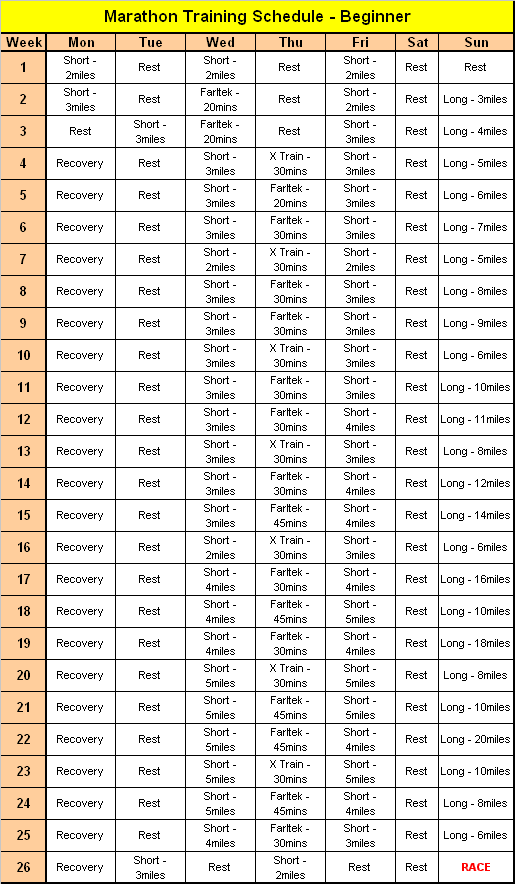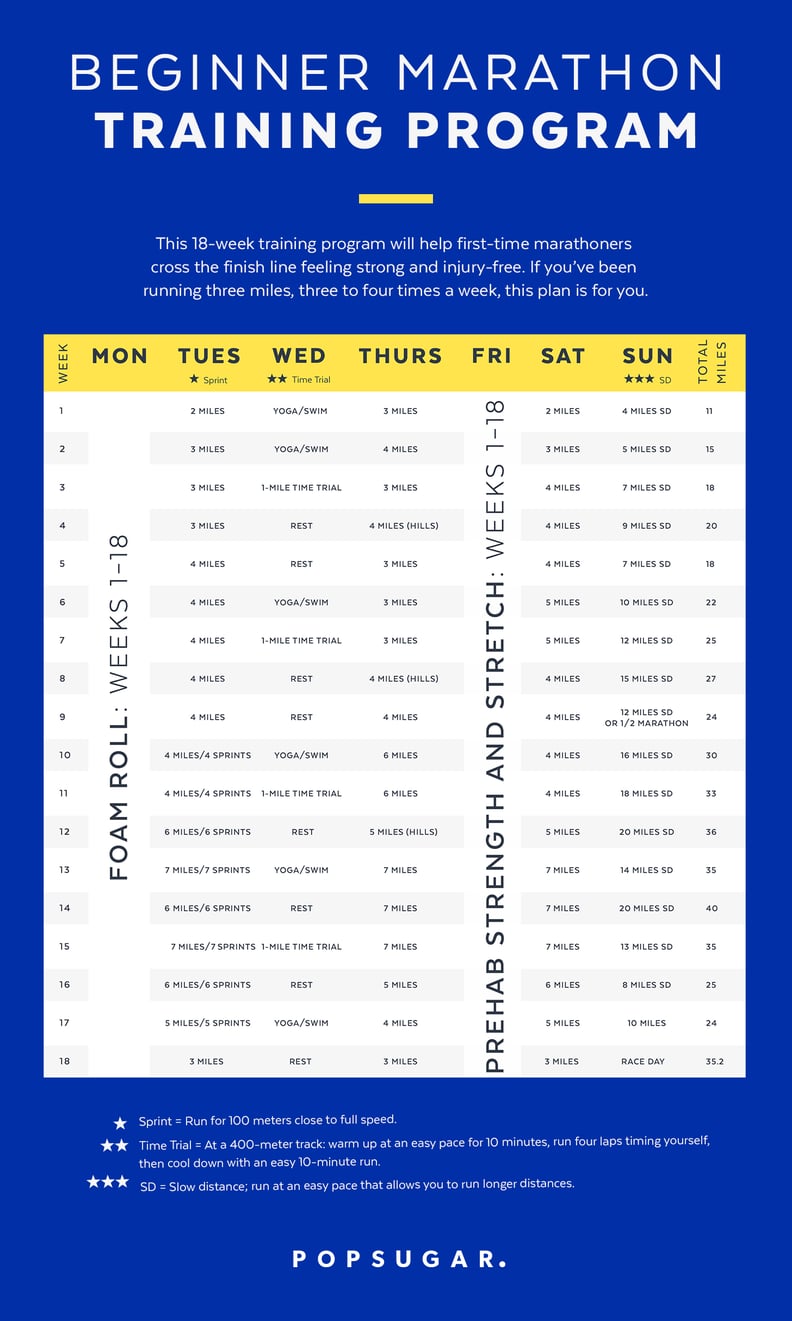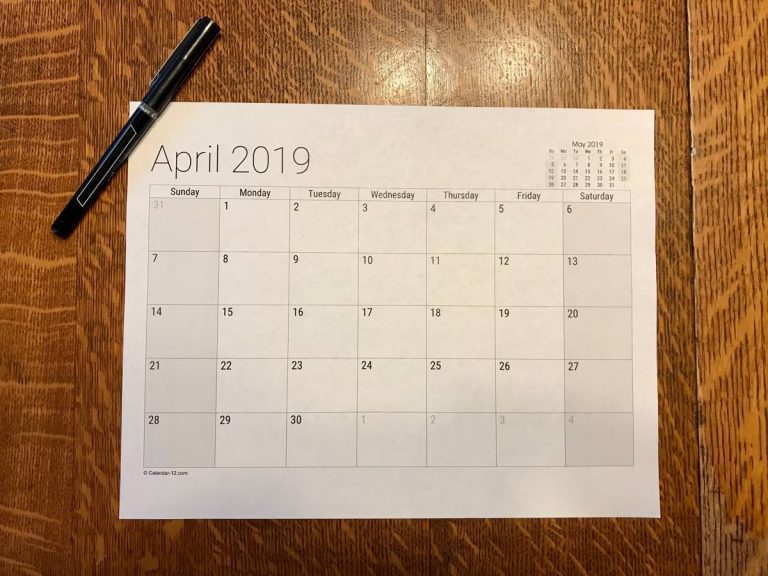Marathon Guide for Beginners
For beginners, training, proper nutrition and rest are key for marathon success. Understand the basics.
Running a marathon is a significant physical and mental challenge that requires proper preparation and dedication. If you are new to marathons, it’s essential to follow a structured training plan, pay attention to your diet, and prioritize rest and recovery.
In this guide, we will explore the essential factors that beginners need to consider in their marathon journey. By focusing on training, nutrition, and rest, you can set yourself up for a successful first marathon experience. Let’s dive into the fundamentals of marathon training for beginners.

Credit: marathonhandbook.com
Choosing The Right Marathon
When embarking on your marathon journey, the first step is making the right choice. Choosing the Right Marathon involves evaluating various factors to ensure a positive experience. Here’s a guide to help you make an informed decision:
Evaluating Distance And Difficulty
Assessing the distance and difficulty level of a marathon is paramount. Begin by considering your fitness level and endurance. Opting for a shorter distance, such as a half-marathon, can be an ideal starting point for beginners.
Considering Location And Climate
The impact of location and climate on your marathon can’t be overlooked. When selecting a marathon, take into account the geographical location and climate conditions. Factors such as altitude, terrain, and weather can significantly influence your performance and overall experience.
Training For Your First Marathon
Are you considering taking on the challenge of training for your first marathon? It might seem daunting, but with the right approach, you can set yourself up for success. Let’s dive into the key aspects of preparing for your first marathon: setting realistic goals, creating a training plan, including rest and recovery, and incorporating cross-training and strength training.
Setting Realistic Goals
Start by setting achievable goals that consider your current fitness level and experience. Don’t aim for a specific time; focus on completing the marathon.
Creating A Training Plan
Develop a progressive training schedule that gradually increases your mileage. Include a mix of short runs, long runs, and cross-training to build endurance.
Including Rest And Recovery
Prioritize rest days to allow your muscles to recover. Listen to your body and don’t push through pain. Adequate recovery is crucial for preventing injuries.
Cross-training And Strength Training
Incorporate activities like cycling or swimming to supplement your running. Strength training helps prevent imbalances and enhances overall performance.
Proper Nutrition And Hydration
A marathon guide for beginners emphasizes the importance of proper nutrition and hydration. These key factors contribute to an athlete’s performance, endurance, and overall well-being during the race. Taking care of your body by fueling it with the right foods and staying hydrated is essential for success in a marathon.
Proper Nutrition and Hydration are crucial elements for beginner marathon runners. Fueling Your Runs properly ensures you have the energy needed to complete your training. Hydration Strategies are equally important to maintain performance and prevent dehydration. ###Fueling Your Runs
Eating a balanced diet rich in carbohydrates, proteins, and fats will provide the necessary energy for your runs. Include fruits, vegetables, whole grains, and lean proteins in your meals. Make sure to eat a small meal rich in carbohydrates and protein 1-2 hours before your run. During longer runs, consume energy gels or chews to maintain stamina. ###Hydration Strategies
Stay hydrated throughout the day, not just during your runs. Drink water regularly to maintain proper hydration levels. Consider carrying a water bottle during your runs. Add electrolyte drinks if you are running for longer durations to replace lost minerals. Be mindful of the color of your urine to gauge hydration levels – it should be pale yellow. ###Pre-race And Post-race Meals
Before a race, opt for easily digestible carbohydrates like oatmeal or whole grain toast. Avoid heavy or high-fat foods. After your race, replenish with proteins and carbohydrates to aid in recovery. Include foods like lean meats, quinoa, and leafy greens in your post-race meal. Remember, proper nutrition and hydration are key for marathon success. Happy running!Race Day Tips And Strategies
Race day can be both exhilarating and nerve-wracking for beginners. To ensure a successful and enjoyable marathon experience, it’s essential to incorporate key tips and strategies. From adequate rest to managing nerves, here are crucial elements to consider when preparing for the big day.
Getting Enough Sleep
Quality sleep is fundamental for race day performance. Aim for 7-9 hours the night before. Establish a bedtime routine to promote restful sleep. Avoid electronics and stimulating activities close to bedtime.
Warming Up And Stretching
Before the race, engage in a gentle warm-up to increase blood flow and loosen muscles. Incorporate dynamic stretches to prepare your body for the upcoming physical activity. Focus on the major muscle groups involved in running.
Pacing And Race Strategy
Maintaining a consistent pace is key for marathon success. Avoid starting too fast to conserve energy for the later stages of the race. Prior to the event, develop a race strategy based on your training and fitness level.
Dealing With Race Day Nerves
Nervousness is natural, but it can impact performance. Utilize deep breathing techniques to manage anxiety. Focus on the present moment and the enjoyment of running the marathon.
Recovering After The Marathon
Completing a marathon is a remarkable achievement that requires dedication, training, and mental resilience. Whether it’s your first or your tenth, the recovery process after crossing the finish line is just as important as the race itself. Properly recovering from a marathon can help you avoid injuries, regain your energy, and get back into running sooner. In this article, we will discuss the essential steps of creating a comprehensive recovery plan that includes rest, safely returning to running, and learning from your marathon experience.
Recovery Plan And Rest
A well-structured recovery plan is crucial for optimizing your post-marathon recovery. This plan will help your body heal, rebuild muscles, and reduce the risk of fatigue-related injuries. Rest and relaxation play significant roles during this period.
Consider the following recovery strategies:
- Active recovery: Engage in low-intensity activities such as walking, swimming, or cycling to improve blood circulation and assist in muscle recovery.
- Rest: Allow yourself a few days of complete rest immediately after the marathon. This downtime will promote healing and replenish your energy reserves.
- Sleep: Aim for an adequate amount of quality sleep each night, preferably seven to nine hours, to facilitate muscle repair and overall recovery.
- Nutrition: Focus on consuming a balanced diet that includes lean proteins, whole grains, fruits, and vegetables to aid in the replenishment of nutrients.
- Hydration: Rehydrate your body by drinking water and electrolyte-rich fluids regularly. Inadequate hydration can hinder the recovery process.
Safely Returning To Running
While rest is crucial, it’s also essential to gradually reintroduce running to your routine. Jumping back into intense training too quickly may lead to injuries. Follow these steps to safely return to running:
- Start with light exercises: Begin with gentle exercises like walking or light jogging to gauge how your body responds.
- Gradually increase intensity: Slowly increase the duration and intensity of your runs over a few weeks. Listen to your body and avoid pushing yourself too hard.
- Strength training: Incorporate strength training exercises to improve overall muscle strength and stability, which supports running performance and reduces the risk of injuries.
- Cross-train: Include cross-training activities like swimming, cycling, or yoga to provide variety, reduce impact on the joints, and improve overall fitness.
- Listen to your body: Pay attention to any signs of discomfort or pain during your runs. If you experience persistent pain or symptoms, consult a healthcare professional before continuing.
Learning From The Experience
A marathon is not only a physical test but also a mental and emotional journey. Taking the time to reflect on and learn from your marathon experience can help you grow as a runner and set you up for success in future races.
Consider these lessons to enhance your future marathon performances:
- Evaluate your training: Review your training regimen to identify areas of improvement. Evaluate your mileage, speed work, and long runs to refine your approach in future races.
- Reflect on mental strategies: Assess your mental strategies during the marathon. Identify the tactics that worked well for you and those that you can improve upon, such as visualization techniques and positive self-talk.
- Celebrate your achievements: Acknowledge your accomplishment and be proud of your hard work and dedication throughout the training and race. Celebrating milestones can boost self-confidence and motivation for future endeavors.
- Set new goals: Use your marathon experience as a stepping stone for setting new running goals. Consider challenging yourself with different race distances, personal records, or even trying alternative forms of endurance activities.

Credit: marathonhandbook.com

Credit: www.sport-fitness-advisor.com
Frequently Asked Questions On Marathon Guide For Beginners
How Long Should A Beginner Train For A Marathon?
Training for a marathon as a beginner typically takes around 16 to 20 weeks. It’s important to gradually increase mileage and incorporate rest days for optimal preparation.
What Are The Essential Items For A Marathon?
For a successful marathon, essential items include proper running shoes, moisture-wicking clothing, a well-fitting sports bra, a hydration belt, energy gels, a GPS watch, and sunscreen for protection.
How Can Beginners Prevent Injuries During Marathon Training?
To prevent injuries during training, beginners should focus on proper warm-ups, cool-downs, and stretching routines. Additionally, listening to their bodies, incorporating cross-training, and gradually increasing mileage can help avoid common running injuries.
Conclusion
Embarking on a marathon journey as a beginner requires dedication, perseverance, and a well-structured training plan. By gradually building up mileage, incorporating strength training, and paying attention to nutrition, you can maximize your potential and achieve your goals. Remember, it’s a process, and consistent effort will ultimately lead to success.
Good luck on your marathon journey!







